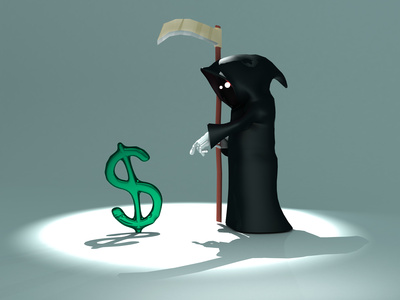There are growing talks about a possible default of the US on its payments. While the chance of this happening remains very low, such an event will have a huge effect on the markets. How will currencies react? Here’s some background and possible movements for selected currencies.
The Unites States is getting close to its self imposed debt limit of 14.3 trillion dollars. The president and the Democrats want to increase the debt limit in order for the government to continue functioning, while the Republicans, who rule Congress, want debt cuts and other concessions in return.
If ends don’t meet, the government will reach this ceiling on May 16th, according to the recent calculations by the US Treasury. They could creatively calculate things differently and extend the deadline till July 8th. But anyway, time is running out.

Reaching the ceiling means that the government won’t be able to borrow, and will have to cut on payments. Payments include medical services which the Republicans want to cut, the big defense bugdet ($664 billion in 2010) or interest payments on debt.
The problem for the US and the whole world is if they miss one interest payment. A failure of the US to service its debt will be horrible – yields will rise, and the US won’t be able to borrow. The Chairman of the Federal Reserve, Ben Bernanke, described such a scenario as a “recovery ending event”.
The whole world will enter into an economic turmoil as the once-considered safe investment will become very unsafe, even if very temporarily. This will be the big double-dip recession.
It’s important to note that the chances are slim. There’s time to scramble some kind of deal in Washington. Nobody wants to be held accountable for such a turn of events. As it happened with the government shutdown talks, the politicians were eventually successful in cutting a deal. This time period could be extended.
But what if this does happen? This is generally bad for the world, but some countries will weather this mess, some will enjoy it, and some will sink, and their currencies will react accordingly.
- The Greenback: Needless to say, the dollar will fall in such a case, together with the US economy. In 2008, it managed to emerge as a winner as the financial crisis that began in the US threatened to cause greater pain in other countries, and the US dollar became a safe haven currency. This scenario isn’t likely to be repeated in case of a US default, as the safe haven and default don’t go well together. But not all currencies will enjoy this fall equally.
- Euro: While Germany’s economy is doing great, the rest of the Euro-zone is still struggling with a sluggish recovery. Greece, Portugal and Ireland, which are indebted will find it even harder to get back to the bond markets, to grow or to service their current debt as global yields rise. Defaults are likely. Also other countries, that have serious debt, might find themselves struggling and joining the club: Spain, Belgium and Italy are next. The Euro is likely to fall with the United States, similar to the event of the 2008 financial crisis.
- British Pound: Britain’s economy is also in pain, also due to the austerity measures. A fall of the US means a fall to commodity prices as well, finishing off the inflation problems and accelerating the fall. Similar to the scenario with the Euro, the British pound may find itself in a deep fall.
- Japanese yen: The Japanese yen enjoyed the safe haven status in the past few years, despite a weak economy and increasing debt. With a default in the US, the markets will look to Japan in being the next economy unable to service its debt. Add the severe damages from the March 11 tragedy and the fact that a significant part of Japan’s exports are to the US, and you get a recipe for Japan losing its safe haven status, and the yen ebing relatively weak.
- Swiss Franc: Contrary to 2008, this time the Swiss franc will enjoy the safe haven flows in a much stronger manner. The Swiss economy is doing great, and while it will take a hit due to the global slowdown, it’s very well positioned and will attract a lot of money and the franc can leap.
- China and the yuan: On on hand, it will enjoy sinking dollar for more competitive exports (due to the peg of the yuan on the dollar), but on the other hand it’s the biggest holder of US debt. I believe that it will eventually strengthen in such a case, will let the yuan further appreciate against the dollar, and advance to being the No.1 economy in a matter of years rather than decades.
- Australian dollar: The Australian dollar might get an initial hit – such a major bad event will trigger risk aversive trading, and the Aussie will suffer. But given China’s strength (Australia’s main trade partner), the Australian economy and the Aussie dollar will eventually emerge as winners.
- Canadian dollar: The Canadian economy is very tightly linked with the American one. It’s not only a commodity country that enjoys higher oil prices, but also very dependent on its southern neighbor. The Canadian economy and the loonie will likely take a big hit in such a case.
- New Zealand dollar: Although at lesser scale than Australia, the kiwi is likely to weather the situation rather well due to the Chinese links.
- Physical previous metals: In case of a US default, the holder of the family silver or the gold bars in the couch will be very happy. When paper is worthless, gold and silver are – good as gold. This will accelerate the current trend.
What are your predictions in case of a US default?
Further reading: Will Bernanke weigh on the dollar?
